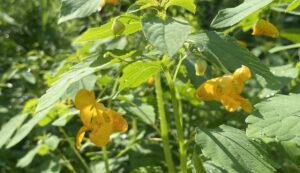
Jewelweed is a widespread and common plant that occurs in moist, semi-shady areas throughout northern and eastern North America. It is a self-seeding annual with beautiful orange flowers that grows until five feet high. The fruit is a long capsule, which bursts open at the slightest touch when ripe. Jewelweed therefore is also often called touch-me-not although the actual touch-me-not plant is a close relative with the name Impatiens pallida, which has yellow flowers. Hummingbirds, bees and butterflies love the plant. Jewelweed easily colonizes disturbed areas and can take it up with the non-native invasive plant garlic mustard. It also has medicinal value:
The US Forest Service writes about jewelweed on their website:
Jewelweed has a long history of use in Native American medicine. When applied topically, sap from the stem and leaves is said to relieve itching and pain from a variety of ailments, including hives, poison ivy, stinging nettle, and other skin sores and irritations. The sap has also been shown to have anti-fungal properties and can be used to treat athlete’s foot.
https://www.fs.fed.us/wildflowers/plant-of-the-week/impatiens_capensis.shtml
We offer in our new shed Poison Ivy First Aid tincture in travel-sized bottles made with jewelweed and vinegar. The jewelweed solution must be used immediately after contact with poison ivy. Just wash the impacted area with the First Aid tincture.
